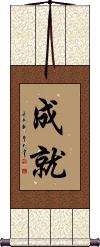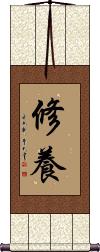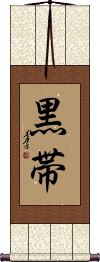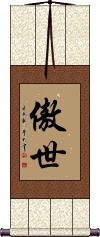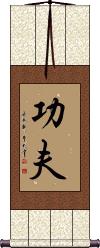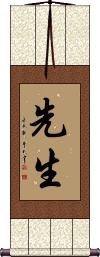Many custom options...
And formats...

Accomplishment in Chinese / Japanese...
Buy an Accomplishment calligraphy wall scroll here!
Personalize your custom “Accomplishment” project by clicking the button next to your favorite “Accomplishment” title below...
1. Achievement / Accomplishment
2. Jiko no Kansei / Self-Completion
4. Black Belt
Achievement / Accomplishment
成就 is the word most often used in Chinese, Korean and Japanese to mean accomplishment or achievement.
成就 can also be used to mean success, attain a result, fulfillment, realization, or completion.
Jiko no Kansei / Self-Completion
Self-Improvement
修養 means self-improvement in Chinese, Japanese Kanji, and old Korean Hanja.
Other translations for this word include accomplishment, training, self-cultivation, (mental) training, self-discipline, cultivation, or cultivating moral character.
Black Belt
These are the Kanji for “Black Belt” in Japanese.
This would be the gift to buy someone who is about to achieve the rank of black belt, or perhaps for yourself, like a certificate on the wall to subtly show your accomplishment.
It should be mentioned that the title “black belt” is not a typical selection for a calligraphy wall scroll.
Note: with a tiny stroke difference on the second character, this also means black belt in Korean Hanja. Let me know if you need the exact Korean version (though any Korean who can read Hanja will know this is black belt).
Proud / Pride / Lofty-Minded
傲世 is a word used to describe someone that is very proud and holds themselves above others but with a valid (earned) reason to do so.
傲世 is what you would use to describe the way a mighty general of ancient China like Cao Cao acted or a more modern person like General Patton carried himself.
If you hang this word on your wall, it suggests that you hope to achieve that same level of pride from accomplishment.
Kung Fu / Gong Fu
功夫 or Kung Fu is one of the most famous types of martial arts in the world - and not just because of Bruce Lee.
Some translate the meaning as “Accomplishment by Great Effort.” I think this is partially true, but directly translated, it literally means “Merit/Achievement/Accomplishment Man.” The word “fu” can sometimes mean “husband” or “porter,” but in this case, it can only mean “man.” However, few in China will think “man” when they hear the word “Gong Fu” spoken.
This term is also used for things other than martial arts. In fact, it's used to refer to a person with excellent skills in crafts that require a lot of effort to master, such as cooking, tea ceremonies, and calligraphy.
What a lot of people don't know is that the spelling of “Kung Fu” was actually taken from the old Wade Giles form of Romanization. Using this method, the sounds of the English “G” and “K” were both written as “K” and an apostrophe after the “K” told you it was supposed to sound like a “G.” Nobody in the west knew this rule, so most people pronounce it with a “K-sound.” And so, Gong Fu will always be Kung Fu for most westerners.
Also, just to educate you a little more, the “O” in “Gong” has a sound like the English word “oh.”
The popular Chinese dish “Kung Pao Chicken” suffers from the same problem. It should actually be “Gong Bao Chicken.”
Historical note: Many will claim that Kung Fu was invented by the monks of the Shaolin monastery. This fact is argued in both directions by scholars of Chinese history. Perhaps it is more accurate to say that the Shaolin Monks brought the original fame to Kung Fu many generations ago.
Japanese note: While most Japanese martial artists will recognize these characters, Katakana is more often used to approximate the pronunciation of "Kung Fu" with "カンフー." Some will argue as to whether this should be considered a Japanese word at all.
See Also: Bruce Lee
Sensei / Master / Teacher / Mister
先生 is sensei, which is associated in the west with a master or instructor of karate, aikido, judo, and other Japanese martial arts.
In reality, this is a term of respect for almost any professional or skilled person (doctor, lawyer, teacher, etc.). Sometimes, it is used for musicians and artists who have achieved a certain level of fame, skill, or accomplishment.
It should be noted that this is also a courtesy title in Chinese but more like calling someone “mister” or “gentleman.” It doesn't have the “master” or “teacher” meaning in Chinese - see our Chinese “Master / Sifu / Shi Fu” entry if your audience is Chinese.
In Korean Hanja, this means teacher, instructor, schoolmaster, or schoolmistress.
This entry is for educational purposes. 先生 is kind of a strange thing to put on a wall scroll. It's a title that is used more orally to show respect rather than something written in calligraphy. If you feel it is appropriate in your circumstances, we will create a piece of sensei Japanese calligraphy artwork for you.
These search terms might be related to Accomplishment:
Ability to Adapt
Achievement
Achievement / Accomplishment
Any Success Can Not Compensate for Failure in the Home
Do Not Fear the Task: Cooperation Will Lead to Success
Dream Come True / Enjoy Success
Energy / Capability
Failure is a Stepping Stone to Success
Failure is the Mother of Success
Failure is the Origin of Success
Geisha of Unequaled Talent
Goodness / Good Deed
Jiko No Kansei / Self-Completion
Leadership / Ability to Lead
Morality of Deed
One Good Deed Each Day
Realization and Knowledge
Realize Your Ambitions / Ride on the Crest of Success
Skill Acquired Through Hard Training
Strength / Ability
Success
Not the results for accomplishment that you were looking for?
Below are some entries from our dictionary that may match your accomplishment search...
| Characters If shown, 2nd row is Simp. Chinese |
Pronunciation Romanization |
Simple Dictionary Definition |
修養 修养 see styles |
xiū yǎng xiu1 yang3 hsiu yang shuuyou / shuyo しゅうよう |
More info & calligraphy: Self-Improvement(n,vs,vi) self-improvement; (mental) training; self-discipline; cultivation cultivating moral character |
成就 see styles |
chéng jiù cheng2 jiu4 ch`eng chiu cheng chiu jouju / joju じょうじゅ |
More info & calligraphy: Achievement / Accomplishment(n,n-suf,vs,vt,vi) fulfillment; fulfilment; realization; realisation; completion; (given name) Jōju siddhi: accomplishment, fulfillment, completion, to bring to perfection. |
功 see styles |
gōng gong1 kung kou / ko こう |
meritorious deed or service; achievement; result; service; accomplishment; work (physics) (1) merit; success; meritorious deed; (2) achievement; accumulated experience; (male given name) Tsutomu Merit, meritorious; achievement, hence 功力 achieving strength, earnest effort after the good). |
勣 𪟝 see styles |
jì ji4 chi isao いさお |
merit; accomplishment (variant of 績|绩[ji4]) (given name) Isao |
勳 勋 see styles |
xūn xun1 hsün isao いさお |
(bound form) meritorious accomplishment (female given name) Isao merit |
績 绩 see styles |
jì ji4 chi tsumugu つむぐ |
to spin (hemp etc); merit; accomplishment; Taiwan pr. [ji1] (given name) Tsumugu |
芸 see styles |
yún yun2 yün nori のり |
common rue (Ruta graveolens); (used in old compounds relating to books because in former times rue was used to protect books from insect damage) art; craft; accomplishment; artistic skill; technique; performance; (personal name) Nori |
藝 艺 see styles |
yì yi4 i kaori げい |
skill; art art; craft; accomplishment; artistic skill; technique; performance art |
三覺 三觉 see styles |
sān jué san1 jue2 san chüeh sankaku |
The three kinds of enlightenment: (1) (a) 自覺 Enlightenment for self; (b) 覺他 for others; (c) 覺行圓 (or 窮) 滿 perfect enlightenment and accomplishment; the first is an arhat's, the first and second a bodhisattva's, all three a Buddha's. (2) From the Awakening of Faith 起信論 (a) 本覺 inherent, potential enlightenment or intelligence of every being; (b) 始覺 , initial, or early stages of such enlightenment, brought about through the external perfuming or influence of teaching, working on the internal perfuming of subconscious intelligence; (c) 究竟覺 completion of enlightenment, the subjective mind in perfect accord with the subconscious (or superconscious) mind, or the inherent intelligence. |
作為 作为 see styles |
zuò wéi zuo4 wei2 tso wei sakui さくい |
one's conduct; deed; activity; accomplishment; achievement; to act as; as (in the capacity of); qua; to view as; to look upon (something as); to take something to be (n,vs,vi) (1) artificiality; pretence; contrived act; (2) {law} (ant: 不作為) commission (of a crime); feasance |
名堂 see styles |
míng tang ming2 tang5 ming t`ang ming tang |
item (in a program of entertainments); trick (act of mischief); worthwhile result; accomplishment; something significant but not immediately apparent; something more than meets the eye |
大成 see styles |
dà chéng da4 cheng2 ta ch`eng ta cheng hironari ひろなり |
(noun/participle) completion; accomplishment; attainment of greatness or success; (given name) Hironari Mahāsaṃmbhava. Great completion. The imaginary realm in which (in turn) appeared 20,000 koṭīs of Buddhas all of the same title, Bhīṣmagarjita-ghoṣasvararāja. |
完成 see styles |
wán chéng wan2 cheng2 wan ch`eng wan cheng kansei / kanse かんせい |
to complete; to accomplish (n,vs,vt,vi) completion; perfection; accomplishment; (given name) Kansei |
完遂 see styles |
kansui(p); kantsui(ik) かんすい(P); かんつい(ik) |
(noun, transitive verb) successful execution; accomplishment; completion; fulfillment; carrying through |
快挙 see styles |
kaikyo かいきょ |
brilliant achievement; spectacular feat; splendid accomplishment; remarkable deed |
悉利 see styles |
xī lì xi1 li4 hsi li shiri |
idem 室利 q.v. 悉地 siddhi, accomplishment, complete attainment, perfection, proof, truth, final emancipation, supreme felicity, magical or supernatural powers; cf. M.W. As supernatural power it is used to end calamities, subdue demons, etc. |
成實 成实 see styles |
chéng shí cheng2 shi2 ch`eng shih cheng shih narumi なるみ |
(surname) Narumi Completely true, or reliable, perfect truth, an abbreviation for成實宗, 成實論, 成實師. |
成果 see styles |
chéng guǒ cheng2 guo3 ch`eng kuo cheng kuo narumi なるみ |
result; achievement; gain; profit; CL:個|个[ge4] (good) result; outcome; fruits (of one's labors); product; accomplishment; (female given name) Narumi |
業績 业绩 see styles |
yè jì ye4 ji4 yeh chi gyouseki / gyoseki ぎょうせき |
achievement; accomplishment; (in more recent usage) performance (of a business, employee etc); results achievement; performance; results; work; contribution |
素養 素养 see styles |
sù yǎng su4 yang3 su yang soyou / soyo そよう |
(personal) accomplishment; attainment in self-cultivation grounding (in a skill or subject); knowledge; training; achievements; attainments; accomplishments |
芸道 see styles |
geidou / gedo げいどう |
performing arts; accomplishment (in performing arts) |
薰成 see styles |
xūn chéng xun1 cheng2 hsün ch`eng hsün cheng kunjō |
accomplishment of perfuming |
貫徹 贯彻 see styles |
guàn chè guan4 che4 kuan ch`e kuan che kantetsu かんてつ |
to implement; to put into practice; to carry out (noun, transitive verb) (1) accomplishment; realization; attainment; fulfillment; achievement; (noun, transitive verb) (2) (non-standard usage) penetration; pervasion; (personal name) Tsuramichi |
遂行 see styles |
suikou / suiko すいこう |
(noun, transitive verb) accomplishment; execution |
達成 达成 see styles |
dá chéng da2 cheng2 ta ch`eng ta cheng tatsunari たつなり |
to reach (an agreement); to accomplish (noun, transitive verb) achievement; attainment; accomplishment; realization; (given name) Tatsunari |
充実感 see styles |
juujitsukan / jujitsukan じゅうじつかん |
sense of fulfillment; sense of completeness; sense of accomplishment; sense of contentment |
圓滿事 圆满事 see styles |
yuán mǎn shì yuan2 man3 shi4 yüan man shih enman ji |
accomplishment(s) |
已辦地 已办地 see styles |
yǐ bàn dì yi3 ban4 di4 i pan ti iben chi |
stage of accomplishment |
引發門 引发门 see styles |
yǐn fā mén yin3 fa1 men2 yin fa men inhotsu mon |
gate to full accomplishment |
成功感 see styles |
chéng gōng gǎn cheng2 gong1 gan3 ch`eng kung kan cheng kung kan |
sense of accomplishment |
Click here for more accomplishment results from our dictionary
The following table may be helpful for those studying Chinese or Japanese...
| Title | Characters | Romaji (Romanized Japanese) | Various forms of Romanized Chinese | |
| Achievement Accomplishment | 成就 | jouju / joju | chéng jiù cheng2 jiu4 cheng jiu chengjiu | ch`eng chiu chengchiu cheng chiu |
| Jiko no Kansei Self-Completion | 自己の完成 | ji ko no kan sei jikonokansei | ||
| Self-Improvement | 修養 修养 | shuuyou / shuyo shuyo / shuyo | xiū yǎng / xiu1 yang3 / xiu yang / xiuyang | hsiu yang / hsiuyang |
| Black Belt | 黒帯 黑帯 | kuroobi / kurobi | ||
| Proud Pride Lofty-Minded | 傲世 | ào shì / ao4 shi4 / ao shi / aoshi | ao shih / aoshih | |
| Kung Fu Gong Fu | 功夫 | kan fu / ku fu kanfu / kufu | gōng fu / gong1 fu / gong fu / gongfu | kung fu / kungfu |
| Sensei Master Teacher Mister | 先生 | sen sei / sensei | xiān shēng xian1 sheng1 xian sheng xiansheng | hsien sheng hsiensheng |
| In some entries above you will see that characters have different versions above and below a line. In these cases, the characters above the line are Traditional Chinese, while the ones below are Simplified Chinese. | ||||
Successful Chinese Character and Japanese Kanji calligraphy searches within the last few hours...
